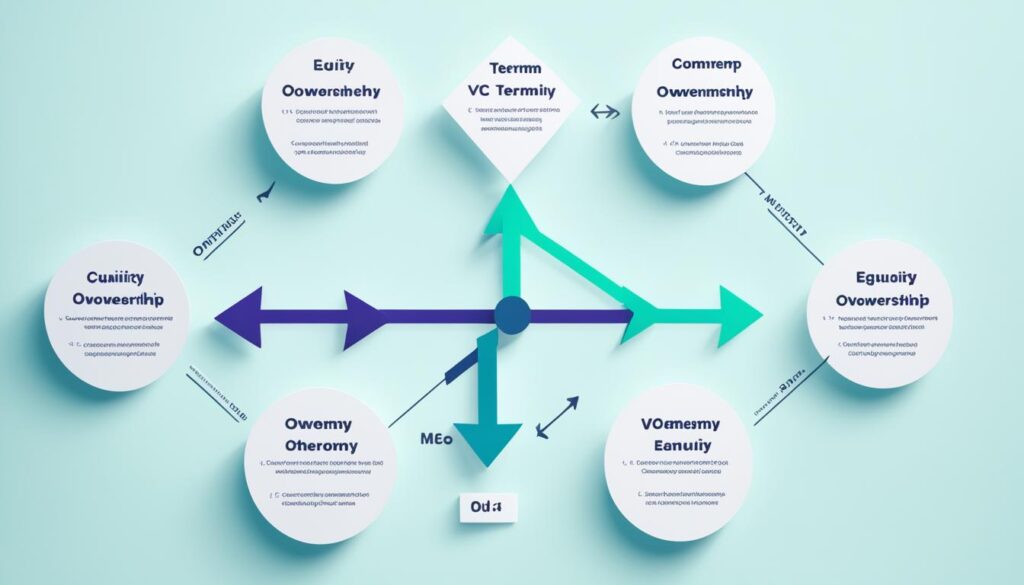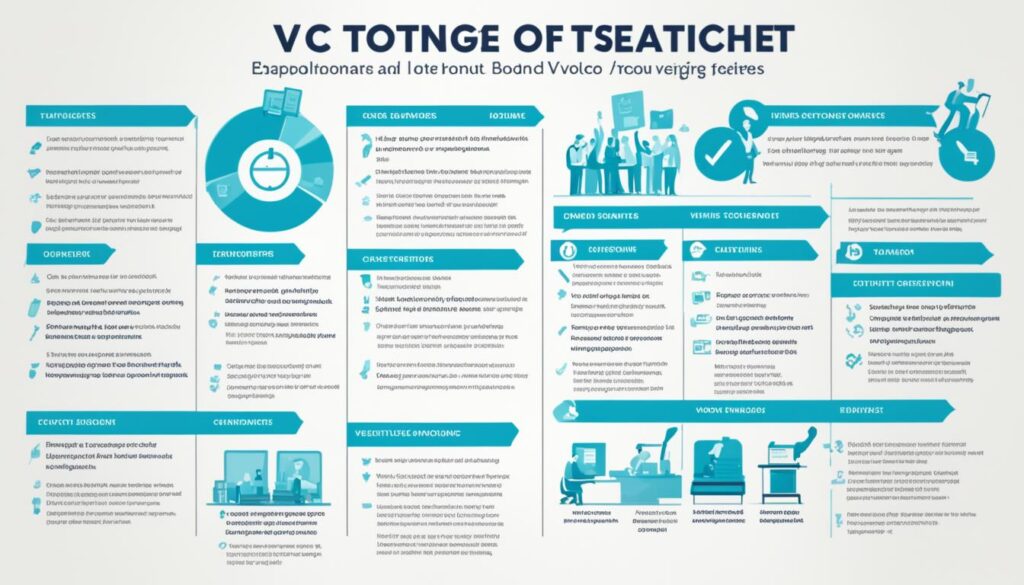As a startup founder, the world of venture capital can be thrilling yet overwhelming. The VC term sheet is a crucial document you’ll come across. It’s a non-binding agreement outlining key investment terms and conditions. So, what important terms should you know about?
Feeling lost in the fine print of a VC term sheet is common. But, interpreting this document correctly is vital for your startup’s future. It can make or break a funding round. Let’s look into the essential terms together. This knowledge is key to securing your startup’s financial health.
Key Takeaways
- A VC term sheet outlines the key terms and conditions of a startup funding round.
- It’s essential for founders to understand the common terms in a VC term sheet. This knowledge helps in effective negotiations.
- Important terms include equity and ownership, valuation and investment, as well as investor rights and protections.
- Founders can benefit from legal advice when reviewing and negotiating a VC term sheet.
- Understanding the VC term sheet is crucial for your startup’s long-term funding success.
Understanding VC Term Sheets

A VC term sheet outlines a startup investment’s key terms and conditions. It is a crucial early document. The VC term sheet guides the final agreement, making the expectations clear for both the investor and the startup.
Definition of a VC Term Sheet
This document is a pre-contract. It details what a venture capital investment will look like. The VC term sheet helps the startup and the investor agree on funding terms before any final contracts are signed.
Importance of Term Sheets for Startups
VC term sheets are vital for startups. They show how the investment will be made, fostering agreement between both sides. Understanding the VC term sheet helps startup founders negotiate and protect their interests, ensuring a good working relationship with their investor.
Equity and Ownership Terms

The equity and ownership terms in a VC term sheet say who owns what in a startup. They decide how much of the company the founders sell. Plus, they show how much the startup is worth and the investor’s share.
It’s key for founders to pick these terms wisely. They need to keep a big piece of their company. At the same time, they have to give the investor a fair amount too.
Figuring out the right equity and ownership terms takes managing many details. Founders talk about how much their startup is valued at, the money coming in, and who gets to make big choices. When they know these terms well, they can protect their business for the future.
Getting help from lawyers who know this stuff can make these talks easier. They can help founders get the best equity and ownership terms for their startup.
| Equity and Ownership Terms | Explanation |
|---|---|
| Percentage of Company Sold | The percentage of the startup’s equity that is being sold to the investor in the current funding round. |
| Valuation | The agreed-upon value of the startup, which determines the price per share and the investor’s equity stake. |
| Investor Ownership Stake | The percentage of the company that the investor will own after the investment is completed. |
| Founder Equity Retention | The percentage of the company that the founders will continue to own after the investment. |
| Voting Rights | The distribution of voting power between the founders and the investor, which can impact decision-making authority. |
Valuation and Investment Terms

In a venture capital (VC) term sheet, key terms help set the startup’s worth and the investment sum. Terms like pre-money and post-money valuation and investment amount and tranches are crucial. They show the startup’s value before and after receiving the investment.
Pre-Money and Post-Money Valuation
The startup’s value before incoming funds is the pre-money valuation. The post-money valuation shows its worth after. These amounts decide how much of the company the investor will get. Negotiating these well is vital for founders. It helps them keep a large part of their business while offering the investor a fair share.
Investment Amount and Tranches
The total investment money is the investment amount. It might be given in parts, known as tranches. This helps the startup use the investment wisely. It’s given as the business meets goals or milestones. Knowing about investments and when you get them is very important for startup owners. It helps them manage their funds and achieve their goals.
| Term | Definition | Example |
|---|---|---|
| Pre-Money Valuation | The value of the startup before the investment | $10 million |
| Post-Money Valuation | The value of the startup after the investment | $15 million |
| Investment Amount | The total capital the investor is providing | $5 million |
| Investment Tranches | The structure of the investment, delivered in multiple installments | $3 million upfront, $2 million upon reaching milestones |
Investor Rights and Protections

VC term sheets offer investors special
rights and protections
. These may allow for
board representation and voting rights
. Investors can help in making decisions. They can make sure their interests are looked after.
Anti-dilution and protective provisions
. These protect the investor’s
equity stake
. It makes sure their ownership remains strong as the company grows.
Founders should aim for good investor rights and protections. This helps them keep control while getting needed funds. Legal experts can guide them through term sheet details. They help reach agreements that benefit everyone.
What are common terms in a VC term sheet?
VC term sheets cover more than just equity and ownership terms. They also talk about founder vesting schedules and non-competition and non-solicitation clauses. These are important to make sure the startup’s goals match those of the VC. They help the business succeed in the long run.
Founder Vesting Schedules
Founder vesting schedules keep the startup’s leaders interested. They get a bit of their ownership from the start, with more coming to them over time. This setup stops them from just walking away. It keeps them focused on making the business go further.
Non-Competition and Non-Solicitation Clauses
Non-competition and non-solicitation clauses block founders from making a rival company. They also can’t take away their old company’s workers. These rules help protect the investor’s stake. Founders need to make sure these rules are fair. That way, they can still find new ways to grow their careers later on.
Exit Strategies and Liquidity Preferences

The VC term sheet talks about how investors will get their money back. It includes info on IPOs and when someone buys the company. Plus, it outlines how much investors get paid first if the company is sold or shuts down. This info is key, setting out who gets what if things change.
IPO and Acquisition Terms
The term sheet details what the investor wants when the company goes public or gets bought. It sets requirements like the lowest value the company should have. It also outlines the investor’s rights and how much time they have to take their money out. These rules make sure investors can get their money back in a way they like.
Liquidation Preferences
When a company sells or ends, certain people get paid first – investors. They often get their money back first, plus more. This is set in stone before anyone else gets a dime. For company owners, knowing these rules is vital to not losing too much of the company’s total worth.
Control and Management Provisions

The control and management provisions in a VC term sheet are key. They say how much the investor can influence the startup’s decisions. This includes approving major business choices and deciding on the board’s makeup. The startup also commits to sharing detailed financial and operational info with the investor.
One vital part of these control and management provisions is the investor’s role on the board. The sheet might state how many board seats the investor can have. This power gives the investor a voice on important matters.
The startup must also agree on how often and what kind of info they share. Openness lets the investor keep an eye on the startup’s progress. It also helps catch and address problems early.
It’s critical for founders to carefully think about these provisions. They need to ensure the startup can still run its day-to-day without too much interference. Finding this balance is vital for a strong partnership and success in the long run.
| Control and Management Provisions | Key Considerations |
|---|---|
| Board Representation | – Number of board seats for the investor – Investor’s ability to influence key decisions – Maintaining founder control and autonomy |
| Reporting Requirements | – Frequency of financial and operational reporting – Level of detail in the information provided – Ensuring transparency while preserving confidentiality |
| Investor Approval Rights | – Specific actions or decisions that require investor approval – Balancing investor oversight and startup autonomy – Ensuring the startup can operate effectively |
Startups win when they understand and negotiate these control and management provisions. Doing this helps keep a balance. This way, the startup can run freely while keeping investors informed and involved.
Confidentiality and Non-Disclosure Terms

Confidentiality and non-disclosure terms in a VC term sheet keep important information safe. This includes details shared by the startup and the investor. These terms stop both parties from telling others about the deal or how the company works.
These confidentiality and non-disclosure terms also protect the parties’ secrets. They keep the negotiation private. Startups need to understand these terms well. They show the duties and rights of each side when it comes to secret info.
| Confidentiality Provisions | Non-Disclosure Provisions |
|---|---|
| Restrict the sharing of sensitive information related to the funding deal, such as the term sheet, valuation, and other financial details. | Prevent the startup and investor from disclosing the company’s trade secrets, customer data, and other confidential operational information to outside parties. |
| Outline the specific information that must be kept confidential and the duration of the confidentiality period, which typically extends beyond the closing of the investment. | Establish the permitted uses of the confidential information and the consequences for unauthorized disclosure, which may include financial penalties or legal action. |
| Provide exceptions to the confidentiality requirement, such as disclosures required by law or to the startup’s professional advisors. | Require the investor to return or destroy any confidential information upon termination of the investment agreement. |
Startups that grasp and discuss the confidentiality and non-disclosure terms can protect their secrets. They help keep the investor’s trust during the funding talks.
Dispute Resolution and Governing Law

The VC term sheet includes how disputes between a startup and investor will be solved. It also states the governing law for the investment agreement. These rules define how to deal with any problems that show up in the investment.
The dispute resolution part talks about what to do if there’s a fight. It might suggest mediation, arbitration, or going to court. The governing law rule shows which legal system will manage the contract.
Setting the dispute resolution method and governing law in the VC term sheet helps avoid big legal fights later. It gives the startup and investor a clear plan for dealing with any issues from the start.
Representations and Warranties

In a VC term sheet, representations and warranties are very important. They make sure the investor knows the startup’s true financial state and operations. If the startup’s claims turn out to be false, these provide a way for the investor to seek legal action.
The representations and warranties touch on many key areas. This includes things like the startup’s ownership structure, intellectual property rights, and regulatory compliance. By making these promises, the startup assures the investor that the information they’ve given is correct.
From the investor’s side, these promises reduce risk. They allow for legal action if the startup hasn’t been completely truthful. This ensures the investor has made a well-informed decision, based on full and clear information.
For founders, negotiating these terms is crucial. They must be fair and not put the startup at risk. With the help of legal experts, founders can find a good middle ground. This is ensuring the investor is reassured while the startup’s interests are looked after.
| Representation and Warranty | Description |
|---|---|
| Organization and Qualification | The startup is properly organized and qualified to conduct business in the jurisdictions where it operates. |
| Capitalization | The startup’s capitalization table accurately reflects the ownership structure and distribution of shares. |
| Financial Statements | The startup’s financial statements are true, accurate, and prepared in accordance with standard accounting practices. |
| Intellectual Property | The startup owns or has the necessary rights to use all intellectual property required for its business operations. |
| Compliance with Laws | The startup is in compliance with all applicable laws and regulations in the jurisdictions where it operates. |
By grasping the role of representations and warranties in a VC term sheet, startup founders can steer through the funding process. This ensures their business’s interests are safeguarded. They also secure the investment needed to grow their company.
Conditions Precedent to Closing
The VC term sheet lays out conditions precedent to closing. These are requirements that must be finished before the deal is sealed. For instance, the startup might need to reach specific goals, get critical approvals, or fix any big legal or financial problems. It’s key for the startup team to dive into these conditions precedent to closing in VC term sheet and understand every inch. Being clear on what’s needed makes the closing go smoothly.
Here are some often-seen conditions precedent to closing in VC term sheet:
- The investor must thoroughly check the startup’s financial, legal, and intellectual property status.
- Getting the okay from necessary third-parties, including shareholders and government bodies, is a must.
- Any legal or rule-related issues need to be sorted, like dealing with ongoing court cases or making sure the business follows all laws.
- The startup might have to meet certain business or money goals, like hitting sales targets or gaining a specific number of customers.
- It’s vital to have the top people in the company on board. This could mean they resign from their current jobs or sign new agreements.
Working closely with good legal advisors is essential for startup founders. They help ensure all the conditions precedent to closing in VC term sheet are met. Tackling these demands head-on can lead to a quick and successful deal closing. This, in turn, opens the doors for the startup’s next growth stage thanks to the investment.
| Condition | Description | Importance |
|---|---|---|
| Due Diligence Completion | Successful completion of the investor’s due diligence process, covering financials, legal, IP, and other critical areas | Ensures the investor has a comprehensive understanding of the startup’s operations and potential risks |
| Third-Party Approvals | Obtaining necessary consents or approvals from existing shareholders, government entities, or other relevant parties | Facilitates a smooth transition and aligns all stakeholders with the investment terms |
| Legal and Regulatory Compliance | Resolving any outstanding legal issues, such as pending litigation, and ensuring full regulatory compliance | Mitigates legal and compliance risks that could jeopardize the investment or the startup’s operations |
| Operational Milestones | Achieving specific operational or financial targets, such as revenue goals or customer acquisition milestones | Demonstrates the startup’s progress and validates the investment thesis, increasing investor confidence |
| Key Personnel Agreements | Securing the resignation and/or execution of new employment agreements with the startup’s critical team members | Ensures the continuity of the startup’s leadership and talent, which is crucial for post-investment success |
Conclusion
Understanding the common terms in a VC term sheet is key. Startups need this knowledge to get the best funding deals. It’s important to know about equity, valuation, and investor rights.
Advice from a legal expert is also very valuable. They can make sure startup founders understand and negotiate well on the term sheet.
The common terms in a VC term sheet often mention preferred shares. These are popular with early investors. They help investors own a certain part of the company even after new investments.
Investment deals may also have anti-dilution terms. These protect investors from losing ownership share with new investments. Usually, these terms are ‘full ratchet’ and ‘weighted average.’
Valuation and investment terms are also vital in a VC term sheet. Details like before- and after-funding worth help define how much of the company startup owners keep. The aim is finding a balance.
Knowing the common terms in a VC term sheet gives founders a strong position. As a result, they can lead their companies to long-term success.
